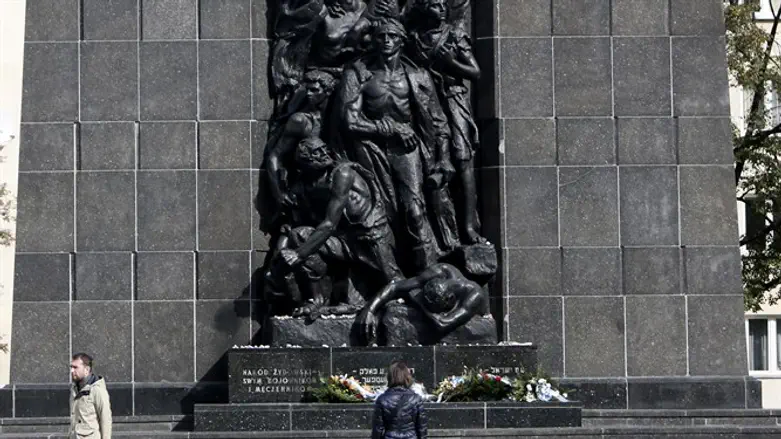
One of the best-known and beloved of modern Hanukkah songs in Israel is "Hava Narima":
הָבָה נָרִימָה נֵס וַאֲבוּקָה,
יַחַד פֹּה נָשִׁירָה שִׁיר-הַחֲנֻכָּה.
מַכַּבִּים אֲנַחְנוּ, דִּגְלֵנוּ רָם, נָכוֹן,
בַּיְּוָנִים נִלְחַמְנוּ, וְלָנוּ הַנִּצָּחוֹן!
פֶּרַח אֶל פֶּרַח, זֵר גָּדוֹל נִשְׁזֹר,
לְרֹאשׁ הַמְּנַצֵּחַ – מַכַּבִּי גִּבּוֹר!
Come – let us raise banner and flaming torch,
Together we will sing the song of Hanukkah.
We are the Macabbees, our flag high and firm,
Against the Greeks we fought – and ours is the victory!
Flower to flower, we will weave a great wreath
For the head of the victor – the heroic Macabbee!
Set to the tune of “See the Conquering Hero Comes” from Part 3 of the oratorio Judas Maccabaeus by the German-born composer Georg Friedrich Händel (1685-1759), the stirring and inspiring Hebrew words were written by Levin Kipnis (1890 or 1894-1990) in time for Hanukkah 5696 (December 1935-January 1936).
Born in Ushomyr (today in the Ukraine), Kipnis made Aliyah in 1913, when Israel was still under the occupation of the Turkish Ottoman Empire (the Caliphate). He dedicated his life to education, particularly of young children; and in his illustrious career – spanning some 80 years! – he wrote some 150 books, more than 1,200 stories, more than 1,000 songs, scores of plays, hundreds of fairy-tales, and fables; he invented educational games, expressions which have become standard popular Hebrew aphorisms, and riddles.
Every child who grew up in Israel over the last three-quarters of a century or more, almost every Jewish child in the Diaspora who learnt Hebrew songs and stories, imbibed Kipnis’s contributions to Hebrew literature.
In those early decades of Zionism, Levin Kipnis was one of the men instrumental in reviving the Hebrew language, infusing it in particular into the infants, children, and youth of Israel with his wildly popular compositions.
Hebrew owes its success as our national language to Levin Kipnis no less than it does to Eliezer Ben-Yehudah, Naftali Hertz Tur-Sinai, Ze’ev Jabotinsky, Rabbi Chaim Hirschensohn, Rabbi Ya’akov Meir, Reuven Alcalay, Avraham Even-Shoshan, and other academic linguists.
Like so many linguists (particularly in those days), Kipnis was fluent in German; he had travelled to Germany in 1922, and during his one year there, studying art and craftsmanship, he wrote three books in German.
In 1935, when Levin Kipnis composed the words “Come – let us raise banner and flaming torch”, global Jewry was tottering on the brink of the abyss. The Nazi Party was in unchallengeable power in Germany, one of the most securely-entrenched Jewish communities in the world facing unprecedented government persecution.
Kipnis was deeply connected with Jewish history and destiny: indeed his very essence, his life’s vocation, was forging Jewish destiny. And he was acutely aware of what was happening to his people in Nazi Germany.
So it is not at all fanciful to suggest that his Hanukkah song “Come – let us raise banner and flaming torch” was his proud, defiant challenge to Nazism.
And viewed in this light, it suddenly becomes far more powerful.
The Nazi Party had adopted the Horst Wessel song as its anthem and marching-song in 1930; when they took power in 1933, the Horst Wessel song became Nazi Germany’s national anthem (alongside “Deutschland Über Alles”).
Its opening words are “Die Fahne hoch!” (“Raise the banner!”) – to which Levin Kipnis defiantly responded: הָבָה נָרִימָה נֵס וַאֲבוּקָה, “Come – let us raise banner and flaming torch!”.
The Nazis were inordinately obsessed with torch-lit parades and rallies at night. So Kipnis, being entirely aware of this predilection of theirs, responded in kind: You raise your Swastika banner in your torch-lit parades? – We raise our banner higher! Our torch will outshine and outburn your torch!
And Kipnis returns to this theme:
מַכַּבִּים אֲנַחְנוּ, דִּגְלֵנוּ רָם, נָכוֹן,
בַּיְּוָנִים נִלְחַמְנוּ, וְלָנוּ הַנִּצָּחוֹן!
“We are the Macabbees, our flag high and firm,
Against the Greeks we fought – and ours is the victory!”
Casting the Nazis as the Greek oppressors would have been entirely in keeping with the spirit of the times, and would certainly have resonated with Kipnis.
And this makes his final words all the more stirring: against the final words of the Horst Wessel song, “The time of servitude will last but a little while now!”, Kipnis threw back the Jewish response:
זֵר גָּדוֹל נִשְׁזֹר, לְרֹאשׁ הַמְּנַצֵּחַ – מַכַּבִּי גִּבּוֹר!: “We will weave a great wreath / For the head of the victor – the heroic Macabbee!”.
No one could have known, when Levin Kipnis wrote these words in 1935, just how much Jewish blood would be shed by the Nazis and their collaborators over the next decade.
But Kipnis, living in Israel, already took up the gauntlet and threw the Nazis’ words back at them, using a stirring tune written by a German.
It is a tribute to him that his words remain so massively popular as a Hanukkah song until today.